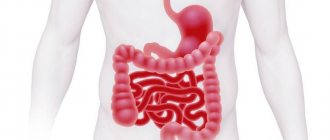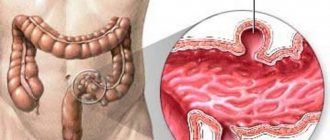Pregnancy is a new period in a woman’s life, when the work of many systems and metabolic processes in her body is restructured. And this is completely justified, because the child needs to create favorable conditions for intrauterine growth and development. Some changes do not pass without leaving a trace - they affect the woman’s well-being. For example, it is not uncommon for intestinal dysbiosis (dysbiosis) to occur during pregnancy. And many need clarification about what this is connected with and what measures are best to take to restore normal functioning of the gastrointestinal tract.
General information
The intestine is an important part of the digestive system, where most nutrients are broken down and absorbed. This process involves various enzymes and substances found in pancreatic juice and bile. The intestinal wall also produces components necessary for digestion. But normal microflora plays a special role in the functioning of the digestive tract and the entire body as a whole. And before considering the origin of dysbiosis, you should understand what it consists of and what functions it performs.
It is known that most of the microbes inhabiting the human body are located in the large intestine. Its composition is quite individual, but the main representatives are:
- Bifidobacteria.
- Lactobacilli.
- Bacteroides.
- Enterococci.
- Escherichia coli.
They constitute the most numerous (about 90%) and relatively constant pool of bacteria. The remaining microbes - streptococci, Proteus, Klebsiella, staphylococci, fungi, etc. - are not always detected and in much smaller quantities, therefore they are recognized as transient or residual representatives of the intestinal biocenosis.
Microbes are in close symbiosis with the human body, exerting a diverse positive effect on the latter:
- Suppression of the growth of pathogenic bacteria (Shigella, Salmonella, etc.).
- Stimulation of immune defense (production of immunoglobulins, interferon, cytokines).
- Participation in metabolic processes (metabolism of proteins, carbohydrates, fats, microelements).
- Production of various biologically active substances (vitamins B1, B6, B9, B12, K, enzymes).
- Neutralization of toxic components (phenols, amines, mercaptans).
Therefore, the normal course of many local and systemic processes largely depends on the state of the intestinal microflora, especially in women carrying a child.
Microflora is an extremely important and necessary element of the intestines, which ensures the normal functioning of the digestive system and the entire body.
Possible consequences
In the absence of therapy and the addition of an infection, vaginal dysbiosis can accelerate the development of inflammatory processes. The consequence of this combination will be bacterial damage to the genitourinary system. First of all, the female genital organs are affected. If the inflammatory process is ignored, the infection will spread to neighboring systems of the body.
Complications of the pathological process:
damage to the vaginal walls (vaginitis);
- cervical infections (cervicitis);
- inflammation of the appendages (adnexitis);
- bacterial damage to the peritoneum (peritonitis);
- damage to the uterine cavity (endometritis);
- inflammation of the ovaries;
- cystitis and pyelonephritis.
Causes of dysbiosis
Disruption of physiological relationships in the environment of intestinal bacteria is provoked by many factors. Dysbacteriosis can appear due to external adverse effects on the body, disturbances in the intestines or other systems. Therefore, the reasons for this condition may be:
- Taking antibacterial drugs.
- Eating disorders.
- Diseases of the gastrointestinal tract (gastritis, duodenitis, colitis).
- Helminthiases.
During pregnancy, other local factors are also present. An enlarged uterus puts pressure on the abdominal organs, pushing them upward, which inevitably affects intestinal function. And the increased concentration of progesterone, in turn, helps to weaken its peristalsis.
In addition, great importance is attached to the relative decrease in the body’s immune defense and psycho-emotional factors. It is not without reason that they say that pregnant women should not worry, but even carrying a child itself is a considerable stress for the body. In addition, as the fetus grows, it requires more and more nutrients, which often leads to anemia in pregnant women. This is another aspect of weakening the defenses.
Dysbiosis in pregnant women is caused by a combination of local causes affecting the intestines and general factors that reduce the body's defenses.
Causes of dysbiosis
There are quite a few reasons that provoke dysbacteriosis in pregnant women. The main role is given to antibiotics, which destroy not only pathogenic microflora, but also beneficial microorganisms. Poor quality food, preservatives, stressful situations, chronic fatigue, radiation, poor ecology - all this can cause disruption of the natural microflora.
Intestinal dysbiosis during pregnancy most often develops against a background of weakened immunity.
Various diseases can also lead to dysbiosis: gastritis, hormonal disorders, hypertension, hypotension, helminthiasis, caries, allergies and more. The death of beneficial bacteria and the rapid development of pathogenic microflora most often occurs against the background of weakened immunity, which decreases just during the period of bearing a child.
The natural weakening of the immune system helps a woman bear a child. Otherwise, the body would reject the emerging life. The fetus is a foreign body for our body. If the immune system worked as usual, any pregnancy would end in miscarriage.
Experts identify four forms of dysbiosis in pregnant women, each of which has its own causes of development:
- transient. Occurs in healthy people and is most often associated with eating habits, professional activities and age characteristics;
- secondary dysbacteriosis that occurs against the background of diseases of the digestive tract: pancreatitis, gastritis, hepatitis;
- dysbiosis due to parasitic, infectious, allergic reactions, as well as immunodeficiencies;
- dysbiosis due to irrational treatment with antibiotics, laxatives and antihistamines.
Symptoms
With intestinal dysbiosis, the normal composition of the microflora is disrupted - its permanent representatives become fewer, and transient or conditionally pathogenic and pathogenic bacteria take first place. This leads to a number of changes in the intestines:
- Flatulence and rumbling in the stomach.
- Diarrhea or constipation.
- Periodic pain (bursting, pulling, colicky pain).
- Change in the character of the stool (mushy, mucus-filled, foamy, sour-smelling, foul-smelling).
- Belching, nausea.
Some of these symptoms, for example, constipation and bloating, can also be observed under physiological conditions in women, especially in later stages. Therefore, they are not inclined to consider them as potentially dangerous. However, if other symptoms appear, you should definitely think about seeing a doctor and getting examined.
In addition to dyspeptic and pain syndrome, dysbiosis during pregnancy is often manifested by general disorders associated with vitamin and mineral deficiency. There may be a deficiency of several substances at once, in the synthesis and metabolism of which intestinal microflora takes part: thiamine, nicotinic acid, rutin, calcium. Signs of dysbiosis also include some types of allergic reactions, for example, chronic food urticaria.
The clinical picture of dysbiosis includes intestinal dysfunction and systemic manifestations indicating a deficiency of certain substances in the body.
Clinical symptoms
Dysbacteriosis during pregnancy manifests itself as follows:
- pain in the umbilical area;
- the appearance of heaviness in the stomach after eating;
- diarrhea;
- flatulence;
- heartburn;
- coated tongue;
- dry skin;
- allergy;
- irritability, anxiety;
- loss of strength, insomnia;
- weight loss;
- increased toxicosis in early pregnancy.
Dysbacteriosis manifests itself in the form of chronic diarrhea
Many of the above symptoms are often accompanied, so often pregnant women simply do not pay attention to them, attributing them to natural processes in the body. Dysbiosis affects both the condition of the mother and the condition of the baby. Maternal microflora becomes the foundation for the formation of intestinal microflora in the fetus.
Hormonal changes occur in the body starting from the first days of pregnancy. It affects all vital systems, and the genitourinary system is no exception. With vaginal dysbiosis, women experience the following symptoms:
- itching and burning of the vulva;
- the appearance of pathological discharge with an unpleasant odor;
- pain in the lower abdomen, which intensifies during intimacy;
- swelling of the labia.
Effect on the fetus
A pregnant woman is primarily concerned about the condition of the child. And although intestinal dysbiosis is the cause of obvious discomfort, not everyone understands how much it affects the fetus. Severe flatulence or increased peristalsis can become factors that provoke an increase in uterine tone. And this, in turn, threatens miscarriage and premature birth. On the other hand, hypovitaminosis and hypocalcemia, which occur with severe dysbiosis, disrupt the normal trophism of the fetus, and therefore its intrauterine development. As you can see, an imbalance of intestinal microflora is not such a harmless condition, but can pose a very real danger during pregnancy.
Treatment
If signs of dysbiosis appear, you should immediately consult a doctor. He will conduct the necessary examination, based on the results of which he will formulate a therapeutic program. But we must remember that treatment of dysbiosis during pregnancy should be as safe as possible and not harm the unborn child.
Diet
Since the state of the microflora largely depends on the substances entering the intestines, the first component of treatment is diet. During pregnancy, you already need to adhere to many rules of healthy eating, and especially with dysbiosis. To normalize the function of the digestive tract, you should limit the consumption of the following foods:
- Sweets and baked goods.
- Pickles and marinades.
- Spicy and fatty dishes.
- Smoked meats and canned goods.
- Whole milk.
- Promoting gas formation (cabbage, legumes, brown bread, spinach).
Fermented milk products, fresh vegetables and fruits are of great importance in the diet. The former are a natural source of lactobacilli, and the latter are rich in fiber - a substrate for their reproduction. In addition, plant substances contain vitamins, the level of which also needs to be increased. You need to eat food often, at least 4 times a day, maintaining an adequate drinking regime.
In case of dysbacteriosis, diet is of great importance. Proper nutrition helps normalize microflora and improve intestinal function, while at the same time being a good means of prevention.
Medicines
The goal of drug treatment of dysbiosis is to destroy pathogenic microbes and enhance the growth of normal ones, primarily bifidobacteria and lactobacilli. The first aspect requires serious consideration, because it involves the use of antibiotics, many of which are not recommended during pregnancy. But in severe cases, they are still used, but only those that do not have a harmful effect on the fetus.
But drugs that promote the proliferation of normal microflora are completely safe and can be taken completely safely by a pregnant woman. Similar medications include:
- Probiotics (Linex, Bifiform, Lactiale).
- Prebiotics (Dufalak, Hilak forte).
- Synbiotics (Bifidumbacterin, Maxilac).
In addition to these drugs, medications with a symptomatic effect, that is, eliminating the main manifestations of the disease, help treat dysbiosis. Depending on the situation, the following medications are prescribed:
- Defoamers (Espumizan).
- Enzymes (Mezim).
- Antispasmodics (No-spa).
It is also recommended to take vitamin and mineral complexes suitable for pregnant women (Elevit, Pregnavit). If dysbiosis develops against the background of chronic pathology of the gastrointestinal tract, then treatment is supplemented according to the diagnosis. But each of the drugs is taken in accordance with medical recommendations.
Any medications are prescribed by a doctor. You should not self-medicate, especially for women expecting a child.
The problem of intestinal dysbiosis is widespread in the population. And during pregnancy, additional factors arise that contribute to its development. Therefore, great importance is given to preventive measures, primarily proper nutrition, normalization of the daily routine, a comfortable psychological environment, as well as timely treatment of chronic intestinal diseases. Maintaining a healthy lifestyle, combined with strict adherence to the doctor’s recommendations, will become the basis for the formation and maintenance of the normal composition of the microflora.
Dysbacteriosis during pregnancy is a rather unpleasant phenomenon that women often encounter while carrying a child. Mostly women develop vaginal dysbiosis when the ratio of lactobacilli and opportunistic microorganisms is disrupted due to a decrease in general immunity. But intestinal dysbiosis also often occurs during pregnancy, which also occurs due to the death of normal microflora and increased proliferation of pathogenic microorganisms in the organ.
Prevention
Dysbiosis during pregnancy is often diagnosed. To avoid the development of the disease, you must follow simple rules.
- Healthy food;
- maintain a daily routine;
- avoid stress, walk more in the fresh air;
- do gymnastics or yoga for pregnant women, in the absence of contraindications;
- promptly identify and treat gastrointestinal diseases and infectious pathologies of the genital area.
Prevention must begin at the stage of pregnancy planning. Get tested for intestinal and vaginal microflora, avoid uncontrolled use of antibiotics.
Dysbacteriosis during pregnancy can pose a threat to the fetus. If unpleasant symptoms appear, you should consult your doctor.
Timely treatment of dysbiosis, diet, and adherence to prevention rules will help reduce the risk of complications.
The material was prepared specifically for the website kakrodit.ru, edited by doctor I.A. Volkova. Specialty: family medicine, general hygiene, parasitology.
Dysbacteriosis is a clinical symptom characteristic of a wide variety of diseases of the gastrointestinal tract. Changes in the composition of microflora lead to the activation of opportunistic microorganisms. Microbial balance is a dynamic indicator that may differ depending on age, nutrition, medication use and the presence of pathological processes.
Dysbacteriosis during pregnancy is a rather unpleasant phenomenon that women very often encounter while carrying a child. What causes this failure, how does it manifest clinically and is it possible to get rid of it? We’ll talk about all this in this article, but first, let’s talk about the role of normal microflora in the body.
Causes
Vaginal dysbiosis develops when beneficial bacteria die, and opportunistic and pathogenic bacteria begin to develop rapidly, which often occurs against the background of reduced immunity (which decreases during pregnancy).
As for the intestinal microflora, it consists of:
- lactobacilli;
- bifidobacteria;
- non-toxigenic clostridia;
- some types of Escherichia (Escherichia coli).
During their life activity, these microorganisms secrete enzymes that facilitate the digestion of food and the absorption of nutrients into the blood. However, the excessive proliferation of some of them, for example, E. coli, as well as the entry of pathogenic microorganisms, such as streptococci, staphylococci, into the intestines, provokes the destruction of beneficial microorganisms and the rapid growth of pathogenic flora, which causes symptoms of dysbiosis in people, including women during pregnancy time.
So, dysbiosis in pregnant women occurs when their immunity drops, and this happens quite often, because such a physiological condition requires the woman’s immune system to put an excessive load on it, aimed at protecting the fetus, while the woman’s body becomes vulnerable. That is, this phenomenon may be natural for pregnant women, but it can also be caused by prolonged use of antibacterial drugs and various diseases, which include:
- gastritis;
- high or low blood pressure;
- diarrhea or constipation;
- salt metabolism disorder.
The development of vaginal or intestinal dysbiosis in pregnant women can also include factors such as poor-quality food, radiation, poor ecology and constant stress.
Causes of dysbiosis
The role of normal microflora
Normally, the intestinal microflora is responsible for performing the following functions in the body:
- digestion of food;
- protection against attack by pathogenic microorganisms;
- activation of the immune system;
- protection against toxic substances entering the bloodstream.
The intestines are inhabited by a huge variety of beneficial microorganisms. Separately, it is worth noting bifidobacteria, which are responsible for the absorption of vitamins and microelements. It is these bacteria that promote the absorption of calcium, iron and vitamin D.
They also produce lysozyme, a substance that prevents pathogens from entering the upper gastrointestinal tract (GIT). Their role also lies in the formation of amino acids, proteins and B vitamins. Infectious processes, long-term antibacterial therapy, artificial feeding - all this leads to dysbiosis, and therefore to the development of complications such as:
- decreased absorption of calcium and vitamin D. The risk of rickets increases significantly;
- to a decrease in iron absorption, which leads to the development of anemia;
- dyspeptic disorders in the form of belching, bloating, lack of appetite, diarrhea;
- malabsorption of nutrients leads to weight gain or loss, dry skin and a general decrease in immunity.
Bifidobacteria are responsible for the absorption of nutrients
Lactobacilli also play an important role. They prevent the occurrence of putrefactive processes and form local immunity. Lactobacilli also affect the digestion of food, enhancing the motility of the digestive tract. In addition, they have antibacterial activity, produce lactic acid, alcohol, lysozyme, and interferons.
Important! With a normal composition of the microflora in the intestines, harmful microorganisms entering the body are repulsed and simply cannot colonize.
Other microorganisms, such as clostridia and Escherichia coli, are also involved in the formation of local immunity. As long as normal biocenosis is maintained, no disruptions occur in the body. When the balance of microflora is disturbed, the level of beneficial bacteria decreases, while opportunistic microorganisms begin to actively multiply.
Symptoms
As has already become clear from the above, dysbiosis during pregnancy can be divided into two forms:
- vaginal;
- intestinal.
If a disorder of the vaginal microbiocenosis develops, a pregnant woman experiences the following symptoms:
- itching and burning in the genital area;
- the appearance of discharge, which can be abundant or scanty, have an unpleasant odor and an unusual consistency (too viscous or, conversely, too liquid);
- pain in the lower abdomen, as well as pain during sexual intercourse;
- swelling of the labia.
If a pregnant woman has developed intestinal dysbiosis, then she is concerned about symptoms such as:
- constipation and diarrhea;
- abdominal pain, which can be localized in the umbilical area;
- the appearance of mucus in the stool;
- general intoxication of the body, manifested by increased body temperature, weakness, fatigue, etc.
Dysbacteriosis in pregnant women
Dysbacteriosis during pregnancy, as a rule, develops not only in the intestines, but also in the vagina.
The disease may be accompanied by stool disturbances, constipation or diarrhea. The fight against constipation during pregnancy occurs even without the presence of dysbiosis, since the fetus puts pressure on the intestines, rectum and blood vessels, which leads to disruption of intestinal motility and bowel movements. The accumulation of feces causes bloating and other unpleasant symptoms, and also leads to intoxication of the body. Dysbacteriosis accompanied by diarrhea is more dangerous, since the inflammatory process and frequent loose stools are an irritant, which can cause uterine tone and, as a result, premature birth. But such symptoms do not develop so often; usually a pregnant woman experiences discomfort in the abdomen associated with bloating, flatulence and pain.
Danger to the fetus
Not only does dysbacteriosis cause a lot of problems for the woman herself during pregnancy - the pathological condition can be dangerous for the child in her womb. In particular, with vaginal dysbiosis, a very common occurrence is an increase in the tone of the uterus, which, accordingly, can cause the threat of miscarriage and premature birth. Uterine tone is also caused by intestinal dysbiosis due to the irritating effect of the organ on the adjacent uterus. Therefore, this phenomenon requires that its diagnosis and treatment be carried out as early as possible, before the mother and the fetus in her womb are harmed.
Other complications that can cause intestinal and vaginal dysbiosis in a pregnant woman are:
- violation of the elasticity of the birth canal, due to which the risk of injury increases during childbirth;
- insufficient supply of nutrients to the fetus due to insufficient absorption by the mother’s body and, as a result, disturbances in the development of the fetus;
- infection of the fetus with streptococci, staphylococci, E. coli and fungi of the genus Candida during childbirth, which can cause many pathological conditions in the newborn, some of which are even life-threatening.
But the most dangerous complication is premature termination of pregnancy, which can occur if dysbiosis is complicated by the symptoms of an inflammatory process that spreads to the upper organs, that is, the uterus and appendages.
Diagnostics
The intestinal form has the same effect on the uterus. From the constant influence of a malfunctioning organ, the adjacent uterus becomes tense. Diagnosis must be made in a timely manner and treatment prescribed.
Complications of disturbed microflora of the vagina and intestines can include:
- An increasing risk of the fetus receiving birth injuries when passing through the birth canal due to impaired muscle elasticity.
- A small amount of nutrients and minerals that are not correctly absorbed by the mother’s body. The result is pathologies in fetal development.
- The entry of bacteria and infection into the child’s body while he moves through the birth canal. It is fraught with the development of emergency conditions for the child, which may affect his further development.
The most dangerous and undesirable complication for the expectant mother’s body is forced termination of pregnancy. Especially in the first months. It occurs in the presence of complications of inflammation, which are provoked by dysbiosis. Failure to promptly seek medical help to treat the inflammatory process leads to its spread to higher internal organs. The uterus and appendages are located there.
The basis for making a diagnosis is the pregnant woman’s complaints, examination results and the conclusion of a gastroenterologist. To prescribe an effective drug, a smear and stool test for dysbacteriosis is prescribed.
Diagnosis, treatment, prevention
The diagnosis can be made based on the complaints of a pregnant woman and examination by a gynecologist and gastroenterologist. But to confirm it and make a differential diagnosis, a vaginal smear and stool test for dysbacteriosis are indicated.
Treatment of pathology during pregnancy has its own characteristics, because women are contraindicated in taking many medications during this period. Therefore, treatment puts the normalization of nutrition in the first place (for intestinal dysbiosis). You can take drugs such as Linex, Bifidumbacterin and others, which will help restore the intestinal microflora, and these drugs do not have side effects on the fetus. Just take them under the supervision of a doctor, since the female body is extremely sensitive during pregnancy and even the most harmless medications can harm it.
If a pregnant woman has vaginal dysbiosis, you cannot do without taking lactobacilli and bifidobacteria, which suppress pathogenic microflora, but do not affect the fetus in the womb. Of course, if inflammatory processes have developed in the vagina, it is advisable to prescribe treatment with antibacterial drugs, which are selected individually in each case.
Prevention of dysbiosis in a woman is important, which should begin in the process of preparing her to become a future mother. Therefore, when a woman is trying to get pregnant, she should be tested for the microflora of the vagina and intestines, which will reduce the likelihood of her developing dysbiosis while carrying a baby. Also, for preventive purposes, pregnant women should use medications that normalize the microflora of the vagina and intestines, and avoid taking potent medications, in particular antibiotics.
Treatment can also be carried out by taking immune boosters. Moreover, this can also be a traditional treatment - it is important to consult with your doctor before starting it, so that the tinctures and decoctions you take do not have a negative impact on the health of the mother and fetus.
Pregnancy is a special condition when all the forces of the female body are aimed at preserving the fetus. In fact, it is a foreign body, so the body suppresses its own immunity so as not to reject the new life that has arisen in the womb.
Against the backdrop of weakening maternal immunity, the composition of the intestinal microflora, and often the vagina, changes. Dysbacteriosis during pregnancy is a common occurrence that can be treated with both diet and medications.
Treatment methods during pregnancy and lactation
Pregnancy and breastfeeding are a special time for a woman, when her nutrition and treatment of diseases should differ from other stages in life. Treatment for dysbacteriosis is prescribed by a doctor. Self-medication with medications is strictly prohibited. Traditional methods may be powerless and may not bring the desired result, and waiting for a child is not the time for experiments.
Medicines can affect the course of pregnancy and the health of the baby. Antibacterial drugs are prescribed with caution. Antibiotic therapy is prescribed only if urgently necessary, if a pregnant or lactating woman has an infectious disease or a bacterial complication after suffering a viral infection. The drugs are selected taking into account contraindications and side effects on the fetus.
To get rid of the symptoms of dysbiosis, therapists recommend an integrated approach to the treatment of microflora disorders, which includes several stages:
Therapeutic diet . With dysbiosis, proper nutrition plays an important role. Foods that cause flatulence, spicy, fried and fatty foods, smoked foods, pickled vegetables, and carbonated drinks should be excluded from the diet.
It is important to eat 4-5 times a day in small portions, eat easily digestible food that does not linger in the intestines for a long time and does not rot.
It is necessary to include fermented milk products, bran, cereals, fruits and vegetables rich in fiber in your diet.
To normalize the microbial composition of the microflora and improve digestion, you need to consume:
- inulin (fiber that promotes the absorption of calcium. Found in chicory, garlic, bananas, artichoke);
- pectin (stimulates the secretion of gastric juice. Found in carrots, ripe apples, pears, apricots, beets, raspberries, currants);
- galacto-oligosaccharides (nutrients, prebiotics that contribute to the formation of the quantitative and qualitative composition of bacteria in the intestines. Found in mangoes, apples, bran, honey, Jerusalem artichoke, tomatoes, garlic, onions);
- fructo-oligosaccharides (carbohydrates, digestible fiber that stimulates the growth of beneficial bacteria. Found in wheat cereals, oatmeal, figs, leeks, chicory, bananas, tomatoes, onions, Jerusalem artichoke);
- raffinose (a trisaccharide that is a nutrient for bifidobacteria. Found in beans, soybeans, Brussels sprouts, beets).
Taking antimicrobial drugs as prescribed by a doctor. Antibiotics are usually prescribed to destroy pathogenic microflora, but antibiotic therapy can negatively affect the baby’s condition. For pregnant women, the doctor may prescribe antimicrobial drugs - plant-based intestinal antiseptics. In difficult cases, certain types of penicillin antibiotics may be prescribed, the use of which is permissible during pregnancy. This treatment should only be prescribed by a doctor.
Taking probiotics and prebiotics . The use of probiotics, prebiotics or symbiotics is a necessary and important action in the complex treatment of dysbiosis. They can be taken during pregnancy and lactation. These bacteria do not have a negative effect on the child.
The danger of intestinal dysbiosis for pregnant women
Normal microflora performs important functions. Its main part is bifidobacteria. Then in number follow lactobacilli and opportunistic microbes - Escherichia coli, clostridia and others.
If for some reason the number of beneficial bacteria begins to decline, their place is immediately taken by pathogenic microorganisms. The main functions of beneficial bacteria in the intestines:
- digestion of food;
- absorption of nutrients (vitamins, minerals and other beneficial substances);
- they prevent the intestines from being colonized by pathogenic microbes;
- prevent toxins from entering the blood;
- are responsible for general and local immunity.
Therefore, even small manifestations of dysbiosis in pregnant women cannot be ignored. In the early stages, disruption of microflora can lead to miscarriage.
Later, the absence or deficiency of bifidobacteria and lactobacilli threatens the appearance of pathogenic flora, its penetration into the blood and infection of the fetus with infectious diseases that can threaten its life.
Symptoms of dysbiosis during pregnancy
Normal bacterial composition of the intestine is a relative concept. The number and ratio of bacteria inhabiting the small and large intestines of humans constantly fluctuates. There are limits to the content of certain microorganisms for the normal functioning of the gastrointestinal tract. If the quantitative or qualitative microbial composition of the mucous membrane is disrupted, the intestines malfunction, which negatively affects the health of the whole organism.
Dysbacteriosis in pregnant women is a common phenomenon that can be caused by various factors or a combination of them. The symptoms of dysbiosis do not depend on the cause that provoked its development. Symptoms may differ only in intensity, depending on the degree of the disorder.
The development of microflora balance in pregnant women is due to decreased immunity and exacerbation of various chronic diseases. Dysbacteriosis can be caused by diseases of the gastrointestinal tract, inflammatory joint lesions, gastritis, caries, hormonal imbalance and other changes. Taking medications, especially antibiotics, can provoke inhibition of beneficial bacteria.
If you are just planning a pregnancy, after antibiotic therapy, doctors recommend delaying conceiving a child until the components of the drug are completely eliminated from the body.
Symptoms of dysbiosis appear with a decrease in beneficial bacteria and an increase in pathogenic microflora. Signs of a violation of the microbial composition in the intestines are the following:
- frequent bowel movements and loose stools;
- constipation;
- alternating diarrhea with constipation;
- rumbling in the stomach;
- nausea and vomiting;
- flatulence, bloating;
- coating on the tongue;
- bad breath;
- spasms in the intestinal area;
- fatigue, weakness;
- worsening sleep;
- allergic manifestations.
The symptoms described above are classic signs of dysbiosis. Often, manifestations of dysbiosis are attributed to the state of pregnancy and are not taken seriously, especially in the early stages, when the expectant mother is worried about toxicosis, loss of appetite, and weight loss.
Vaginal dysbiosis
Despite the anticipation of the happiness of motherhood, a woman’s condition often leaves much to be desired. One of the problems is vaginal dysbiosis during pregnancy. Changing the composition of bacteria towards pathogenic ones can bring a lot of trouble. Microbes change the structure of the vaginal walls, making them looser.
If a woman is planning a pregnancy, doctors warn about the need to test for vaginal microflora. In the early stages, it can cause spontaneous abortion.
The main “enemy” of a woman and her unborn baby is anaerobic vaginosis. It can harm the fetus by infecting the membranes and causing premature release of water. Possible infection of the birth canal and the onset of premature labor.
The danger also lies in the fact that at the time of birth, a large number of pathogenic microbes may be in the vagina, which will initially colonize the baby’s digestive system.
Danger to child
The disease does not have a direct negative effect on the fetus, but negatively affects the body of the expectant mother. Negative consequences for the unborn child may include the following:
- The intestines are unable to absorb the required amount of nutrients. This means that the fetus will not receive enough vitamins and minerals necessary for development, which will negatively affect its development.
- Constant flatulence can lead to increased uterine tone. This is fraught with early birth, and in the early stages – termination of pregnancy.
- Finally, poor health increases the already increased anxiety of a pregnant woman, which negatively affects her health. The body's defenses are reduced, which makes the pregnant woman more susceptible to infectious diseases, which are always potentially dangerous for the unborn child.
Therefore, if dysbiosis is suspected, it is necessary to undergo a full examination as soon as possible and receive recommendations for treating the disease. This will avoid negative consequences not only for the mother, but also for the child.
Signs of dysbiosis
Dysbacteriosis during pregnancy is manifested by the usual signs of microflora disturbance:
- bloating;
- frequent diarrhea;
- heartburn;
- heaviness after eating and pain in the umbilical region.
The skin, already suffering during pregnancy, becomes completely dry; in the first months of pregnancy, toxicosis worsens, and even weight loss is possible. If dysbiosis is not treated, it can cause a nervous disorder - irritability, poor sleep, bad mood.
Vaginal dysbiosis can be easily identified by the following symptoms:
- a large amount of discharge with an unpleasant odor;
- unusual consistency of discharge - too thick or, conversely, liquid;
- itching and discomfort in the vaginal area;
- The color of the leucorrhoea changes – it becomes dark green.
Vaginal dysbiosis may be accompanied by pain during sexual intercourse.
Why does dysbacteriosis occur?
Dysbacteriosis during pregnancy is a syndrome that accompanies the general condition of the expectant mother, especially if the immune system is severely suppressed. It is not necessary for all women to have it. But there are risk factors:
- poor nutrition, lack of vitamins;
- unfavorable environmental conditions at the place of residence;
- antibiotic therapy;
- diseases of the digestive organs (liver and gall bladder).
If a woman is nervous a lot, she experiences frequent stress, and she also runs the risk of developing dysbacteriosis.
Vaginosis during pregnancy can be a consequence of hormonal changes. The amount of progesterone increases with a relative decrease in estrogen. This is also a forced measure on the part of a pregnant woman’s body, reducing the risk of fetal rejection. Other factors:
- endocrine pathologies;
- disturbance of microflora in the intestines;
- insufficient intimate hygiene or, conversely, excessive use of soap and douching;
- taking antibiotics, especially uncontrolled;
- means of hygiene and contraception shortly before pregnancy - tampons, caps, diaphragm;
- promiscuity in sexual contacts.
Vaginal dysbiosis is not a sexually transmitted disease and is not sexually transmitted.
Diagnosis of dysbiosis during pregnancy
To establish intestinal dysbiosis during pregnancy, standard tests and examinations are prescribed. They do not harm either the woman or the unborn child:
- Ultrasound of the abdominal organs allows you to see intestinal pathology, due to which the normal biocenosis in the intestines is disrupted (formation of bacteria);
- coprogram - a stool analysis that will show how well food is digested and absorbed;
- Bacterial culture will show the quantitative content of bacteria.
To diagnose vaginal dysbiosis, a smear is taken from a woman, the acidity of the environment in the vagina is determined and a visual examination is performed.
Urogenital candidiasis or thrush
Finally, the problem of urogenital candidiasis or so-called thrush . The causative agent of this disease is fungi of the genus Candida. In America, more than 100 million women and children suffer from thrush. The frequency of vulvovaginal candidiasis in Russia over the past 10 years has almost doubled and amounted to 30-45% in the structure of infectious lesions of the vulva and vagina. (A.L. Tikhomirov, Ch.G. Oleinik, 2001).
Well-known risk factors for fungal infections are taking antibiotics, hormonal drugs, including contraceptives, various chronic diseases, an unbalanced diet with a lot of carbohydrates, long-term stress, in a word, everything that weakens the immune system.
Considering all of the above, the basic principles of treatment for vaginitis should be the following:
- normalization of vaginal pH;
- restoration of normal biocenosis;
- increasing local immunity.
All this can be achieved by prescribing preparations based on lactobacilli for vaginal sanitation, because it is these preparations that provide an acidic environment in the vagina due to the production of acid during the enzymatic breakdown of glycogen contained in the vaginal epithelium; synthesize substances with antimicrobial and lysozyme activity, and the production of hydrogen peroxide by lactobacilli limits the growth of other microbes. Recently, New Scientist magazine informed its readers that a Swedish company plans to produce vaginal tampons and sanitary pads with live lactobacilli.
Due to the importance of the problem under discussion, I would like to draw attention to means for correcting various microbiocenoses of the human body - liquid bacterial concentrates or liquid probiotics . These drugs are a microbial mass of bacteria in a living biologically active form. Prepared on the basis of pure cultures of microorganisms, representatives of normal human microflora. They have a number of advantages over dry probiotics.
Treatment of intestinal dysbiosis
Intestinal dysbiosis during pregnancy is primarily corrected through diet. It is especially important due to the fact that during this time, medication intake is severely limited. What will the doctor recommend? First of all, avoid any foods that cause irritation. The following should be excluded or limited from the menu:
- a large number of meat products, they cause rotting in the intestines;
- simple carbohydrates - sugar, candies, sweets, carbonated drinks - cause fermentation;
- rich broths provoke increased production of intestinal juice;
- All sour, spicy, spicy and plant foods containing essential oils irritate the intestinal mucosa.
The diet should include:
- fruits (but not sour);
- cereals, especially buckwheat, millet, rye;
- tomatoes, zucchini, carrots, cabbage;
- fermented milk products.
In addition to diet and depending on the severity of the syndrome, medications are prescribed. Dysbacteriosis in pregnant women today is treated with drugs containing probiotics. They are not capable of harming the fetus, since they contain only microorganisms that should populate the intestines and have a beneficial effect on the functioning of the entire digestive system.
Preparations containing bifidobacteria and lactobacilli are added to treatment with probiotics. In combination with a diet, the unpleasant manifestations and dangerous consequences of dysbiosis can be eliminated within a month.
Features of treatment
The goal of treating dysbiosis during pregnancy is to normalize normal microflora. Therapeutic therapy may vary slightly depending on the duration of pregnancy, the severity of the process and the presence of concomitant pathologies. Dysbacteriosis can be treated using medicinal and non-medicinal methods.
Compliance with dietary nutrition is an important element of therapy. To stabilize the growth of beneficial microorganisms, it is recommended to consume cereals: millet, buckwheat, rye. The diet should be enriched with seasonal fruits and vegetables: cabbage, tomatoes, zucchini, carrots. Particular attention should be paid to fermented milk products.
Diet for intestinal dysbiosis
Products containing yeast cultures are considered harmful:
- fresh bread;
- kvass;
- grape;
- sweets;
- preservatives;
- refined products.
Many medications are prohibited during pregnancy. Even such a seemingly harmless disorder as dysbiosis cannot be ignored. Medications are prescribed along with a diet, but do not exclude diet correction. Without dietary restrictions, any medicine will not give the desired result. Currently, probiotics, which contain live microorganisms, are very popular.
Some drugs contain microorganisms that are not naturally found in the intestines.
Probiotics are approved for use from the first trimester of pregnancy; they are absolutely safe for mother and child
Simple recommendations from specialists will help prevent the development of the disorder:
- rational use of antibiotics under medical supervision;
- timely treatment of any gastrointestinal diseases;
- good nutrition;
- increasing immunity;
- taking vitamin complexes as prescribed by a doctor.
So, dysbiosis during pregnancy is a common phenomenon, the appearance of which is associated with a natural weakening of the immune system. In the early stages, the disorder may, generally speaking, not manifest itself, but as the pathological process progresses, abdominal pain, bloating, nausea, and diarrhea appear.
Dysbacteriosis is not such a harmless disorder as it might seem at first glance. It can lead to miscarriage and premature birth. To avoid serious complications, it is extremely important to listen to the recommendations of a specialist. Taking probiotics in combination with dietary nutrition will help speed up the healing process and restore normal microflora.
Source: MedBoli.ru
How to treat vaginal dysbiosis
Gynecologists divide the treatment of vaginal dysbiosis into two stages - the destruction of pathogenic bacteria with the help of antifungal and antibacterial medications and the “population” of the microenvironment with beneficial microbes. The difficulty of treatment lies in the impossibility of using antifungal and other drugs in the first months of gestation.
Metronidazole and similar medications may harm the fetus during the first trimester. They begin to be used later - in the second trimester and only in short courses (no more than 5 days).
During the entire period, three control tests are carried out to determine the state of the vaginal microflora. The goal of treatment is to bring the woman’s birth canal in full order by the due date or at least minimize the risk of infection of the child during childbirth.
Modern medicine offers topical medications that restore the normal number of lactobacilli in the vagina (for example, Lactonorm).
What needs to be done to prevent dysbiosis
The most effective prevention of intestinal dysbiosis during pregnancy is proper nutrition. Beneficial bacteria need low molecular weight sugars that enter the body with fiber from vegetables, fruits and cereals.
You should avoid the use of antibiotics and treat any illness during pregnancy only under medical supervision. Prevention of vaginal dysbiosis involves timely treatment of any sexually transmitted infections.
It is important to do this before pregnancy. Strengthening the immune system with the help of vitamin complexes prescribed by your doctor will also help. Eating well not only affects your gut flora, but also helps maintain a healthy balance of bacteria in your vagina.
By following the doctor's instructions, leading a healthy lifestyle and avoiding stress, a woman is able to make the difficult period of pregnancy more comfortable for herself and safer for the child.











